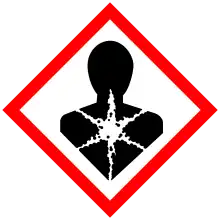 | |
| Names | |
|---|---|
| Other names
Nickel(II) tungstate Nickel tungsten oxide | |
| Identifiers | |
3D model (JSmol) |
|
| ChemSpider | |
| ECHA InfoCard | 100.034.560 |
| EC Number |
|
PubChem CID |
|
CompTox Dashboard (EPA) |
|
| |
| |
| Properties | |
| NiWO4 | |
| Molar mass | 306.534 |
| Appearance | green crystals[1] |
| Odor | odourless[1][2] |
| Density | 3.3723 g/cm³[3] |
| Melting point | 1420 ˚C[4] |
| 465,2 mg/100 mL (20 ˚C) | |
| Solubility | soluble in ammonia |
| Structure | |
| monoclinic crystal system | |
| Hazards | |
| GHS labelling: | |
  | |
| Danger | |
| H317, H350i, H372 | |
| P201, P260, P280, P308+P313, P405, P501 | |
| Related compounds | |
Other anions |
Nickel(II) chromate Nickel(II) molybdate |
Other cations |
Iron(II) tungstate Cobalt(II) tungstate Zinc(II) tungstate |
Except where otherwise noted, data are given for materials in their standard state (at 25 °C [77 °F], 100 kPa).
Infobox references | |
Nickel tungstate is an inorganic compound of nickel, tungsten and oxygen, with the chemical formula of NiWO4.
Preparation
Nickel tungstate can be prepared by the reaction of nickel(II) nitrate and sodium tungstate:[5]
- Ni(NO3)2 + Na2WO4 → NiWO4 + 2 NaNO3
Nickel tungstate can also be prepared by the reaction of nickel(II) oxide and tungsten(VI) oxide.[6]
It can also be obtained by the reaction of ammonium metatungstate and nickel(II) nitrate[7] or from the reaction of sodium tungstate, nickel(II) chloride and sodium chloride.[8]
Nickel tungstate undergoes a phase transition at 700°C.[5]
Properties
Nickel tungstate is a light brown, odourless solid that is insoluble in water.[2] The amorphous form is green and the polycrystalline form is brown.[5] It crystallizes in the wolframite crystal structure of the monoclinic crystal system with space group P2/c (No. 13).[9][8] The compound is antiferromagnetic.[10][11]
Applications
Nickel tungstate has no commercial uses. It has been examined as a photocatalyst, in humidity sensors, and in dielectric resonators. It is also considered as a "promising" cathode material for asymmetric supercapacitors.[1][12]
Other compounds
Nickel tungstate forms compounds with ammonia, such as NiWO4·2NH3·H2O which are cyan crystals,[13] NiWO4·4NH3 which are green crystals,[14] NiWO4·5NH3·H2O as dark blue crystals[13] or anhydrous NiWO4·6NH3 which is crystalline purple, while the octahydrate of hexamine is dark blue.[14]
References
- 1 2 3 Nickel tungsten oxide, 99.9% (metals basis excluding Co), Co <100ppm at AlfaAesar, accessed on {{{Datum}}} (PDF) (JavaScript required).
- 1 2 Record of Nickel-Wolframtetraoxid in the GESTIS Substance Database of the Institute for Occupational Safety and Health, accessed on 2020-01-08.
- ↑ Hicham Oudghiri-Hassani, Fahd Al Wadaani – Preparation, Characterization and Catalytic Activity of Nickel Molybdate (NiMoO4) Nanoparticles. doi:10.3390/molecules23020273.
- ↑ Lebukhova, N. V.; Inorganic Materials, (2006), 42(3), 310-315, CAplus
- 1 2 3 A. Kuzmin, J. Purans, R. Kalendarev: Local structure and vibrational dynamics in NiWO4. In: Ferroelectrics. 258, 2001, S. 21, doi:10.1080/00150190108008653.
- ↑ Falko P. Netzer, Alessandro Fortunelli (2016), Oxide Materials at the Two-Dimensional Limit (in German), Springer, p. 386, Bibcode:2016omtd.book.....N, ISBN 978-3-319-28332-6
{{citation}}: CS1 maint: date and year (link) - ↑ J.M. Quintana-Melgoza, J. Cruz-Reyes, M. Avalos-Borja: Synthesis and characterization of NiWO4 crystals. In: Materials Letters. 47, 2001, S. 314, doi:10.1016/S0167-577X(00)00272-X.
- 1 2 R. O. Keeling: The structure of NiWO4. In: Acta Crystallographica. 10, S. 209, doi:10.1107/S0365110X57000651.
- ↑ Mark Ladd, Rex Palmer (2014), [, p. 277, at Google Books Structure Determination by X-ray Crystallography Analysis by X-rays and Neutrons] (in German), Springer Science & Business Media, p. 277, ISBN 978-1-4614-3954-7
{{citation}}: Check|url=value (help)CS1 maint: date and year (link) - ↑ C. Wilkinson, Μ. J. Sprague: The magnetic structures of NiWO4 and CoWO4. In: Zeitschrift für Kristallographie - Crystalline Materials. 145, 1977, doi:10.1524/zkri.1977.145.16.96.
- ↑ Alexei Kuzmin, Aleksandr Kalinko, Robert Evarestov: First-principles LCAO study of phonons in NiWO4. In: Open Physics. 9, 2011, doi:10.2478/s11534-010-0091-z.
- ↑ R.A. Evarestov (2013), Quantum Chemistry of Solids LCAO Treatment of Crystals and Nanostructures (in German), Springer Science & Business Media, p. 480, ISBN 978-3-642-30356-2
{{citation}}: CS1 maint: date and year (link) - 1 2 Nickel: sect. 1-2. Coordination compounds with neutral and inner-complex-forming ligands (Verlag Chemie, 1968), page 109. Retrieved 15 Apr 2021.
- 1 2 Bulletin de la Société chimique de France (Société chimique de France; Masson, 1921), page 1487. Retrieved 28 Feb 2021.